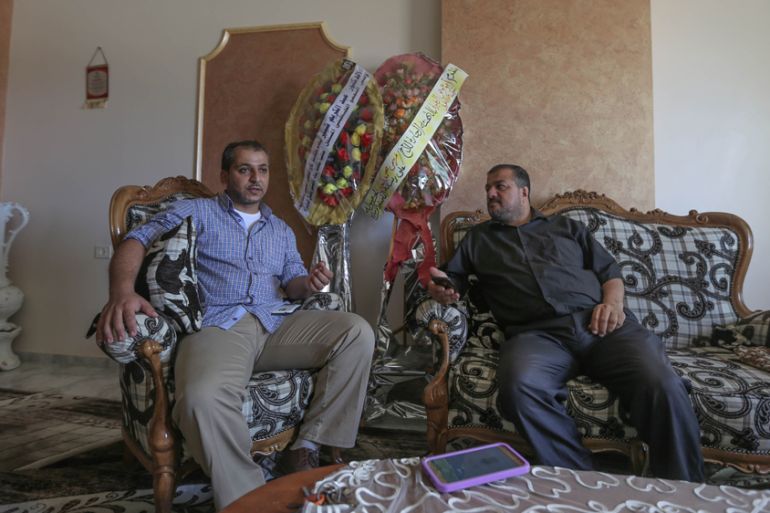West Bank Palestinians exiled to Gaza dream of home
Residents expelled by Israel to the besieged Gaza Strip 14 years ago say they have been estranged from their origins.

Gaza City – Fahmi Kanan’s only desire these days is to be with his elderly father, whose health has rapidly deteriorated in recent months.
“I want to see my father before any bad news strikes me,” Kanan, 47, told Al Jazeera from his home in Tel al-Hawa, Gaza.
Keep reading
list of 4 itemsAre settler politics running unchecked in Israel?
What is Israel’s bulldozer strategy in the occupied West Bank?
Israeli raids cause ‘worst destruction in decades’ in Tulkarem
But an impassable distance separates father and son: While Kanan’s father remains in their hometown of Bethlehem in the occupied West Bank, Kanan was expelled 14 years ago to the besieged Gaza Strip.
He was among several dozen West Bank residents exiled by Israel to Gaza or Europe as part of a deal with the Palestinian Authority (PA) to end Israel’s 2002 siege on the Church of the Nativity during the second Intifada. The siege was part of Israel’s effort to apprehend a number of wanted Palestinians holed up inside the church.
“More than 200 people barricaded ourselves inside the church, but Israel had identified 39 as “terrorists” who had to be deported to lift the siege,” Kanan recalled, noting that he had sought refuge in the church as violence raged in the area. He acknowledged that he was among the wanted men, having fought to resist the Israeli occupation.
Although the deal was supposed to involve only a temporary exile, Kanan said, Israel has not allowed any of the expelled Palestinians back home to the occupied West Bank. They have been kept apart from their families and relatives, as Israel has refused to grant them permits to travel from Gaza into Israel through the Erez crossing.
Hope has shrunk, and I fear I can only be back if I am carried in a coffin.
Although it is also possible to exit Gaza via the Rafah crossing into Egypt, this crossing is frequently closed, and the expense of the journey is much greater, Kanan said. Although his family has taken this journey twice without him over the past 14 years to visit grandparents and relatives in Bethlehem, Kanan himself is not allowed into the West Bank owing to Israel’s ban.
Some of the other Palestinians who were expelled to Gaza under the 2002 deal have had parents and other family members in the West Bank die, without being able to bid farewell or even attend their funerals.
Majdi Danaa, 37, received news of his father’s death a year ago.
“The exile has deeply estranged me from my origins,” Danaa told Al Jazeera. “Hope has shrunk, and I fear I can only be back if I am carried in a coffin.”
Danaa said he had been engaged to a woman in Bethlehem before his expulsion, and he planned to return to marry her – but when his exile continued indefinitely, he was ultimately forced to give up.
“I kept waiting until I realised that it was totally pointless,” Danaa said. Years later, in 2009, he married a woman from Gaza, and they now have two children.
Throughout the course of their exile, the group has appealed to international bodies and human rights organisations such as the United Nations and the International Committee of the Red Cross, asking for help to end their ordeal – but their pleas have been to no avail.
Contacted by Al Jazeera, the UN and the ICRC said the issue was outside their mandate.
IN PICTURES: Nakba – ‘Palestinians will return to their stolen lands’
Kanan and some of the other exiled men also blame the PA for their predicament, citing indifference from the Palestinian leadership.
“We feel that we are abandoned and banished from all sides,” he said.

PA spokesperson Yousef el-Mahmoud told Al Jazeera that the Palestinian government was working to aid Kanan and the other exiled men.
Every spring, upon the anniversary of their exile, those living in Gaza reiterate their demands to return home. They believe their situation could be settled through negotiations between the PA and Israel, or possibly through a future prisoner exchange deal – but so far they have yet to see any progress.
Meanwhile, the men continue to languish in exile.
Raed Abiat says the years he has spent away from his family and hometown have left him with a heavy heart. He is deeply concerned about the health of his father, who suffers from an aggressive form of cancer.
“I am deprived of my right to take care of my father when he is in an acute need for me to be with him,” Abiat told Al Jazeera in a broken voice.